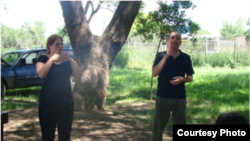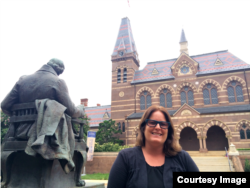There are an estimated 360 million deaf people around the world.
Rue Winiarczyk is one of them. Growing up in Canada, she attended a school for deaf students, enjoying the advantages of living in a society attuned to the meeting the needs of its disabled citizens. However, she soon learned her experience is far from the reality for deaf people around the world.
Winiarczyk was 20 when she traveled to Panama where she expected to experience the culture shock, but not the lack of deaf services that she had learned to take for granted.
"I met several deaf individuals in Panama," said Winiarczyk, who now lives in the United States. "In the deaf community, the interpreter service was very scarce...the opportunity we have here in the U.S., other countries don’t necessarily have.”
She also found many in Panama's deaf community weren’t aware of their basic rights. They believed their disability was a kind of cosmic punishment and accepted being marginalized by society.
The trip, back in 2000, shaped Winiarczyk‘s future. After that, she enrolled at Gallaudet University in Washington, D.C., the only university specifically focused on deaf education, where she signed up for the International Development graduate program.
“That’s to prepare people to go overseas and learn how to include people with disabilities in jobs or in schools," said Amy Wilson, an associate professor who coordinates the program. "Same thing with deaf people; how do you help them understand their language better.”
Students take courses for two years and then two semesters of internship experiences, "with a development organization of their choice in D.C., then the second experience is overseas,” Wilson said.
Winiarczyk went to Kuala Lumpur to work with the Malaysian Federation of the Deaf.
“I did a needs assessment which prioritized what the needs of the deaf community were," she said. "Accessibility was one of the main concerns. For example accessibility to interpreting services was needed. There were approximately 80 interpreters in Malaysia at that time, so, formal trainings (preferably college or university level) was needed in order to train interpreters to ensure the appropriate level of services was provided for deaf people.”
Since her internship there in 2010, Winiarczyk says deaf services have been improving.
“I still connect with some of them in Malaysia through Facebook, who work with advocacies and law," she said. “I used inclusive mixed methods to conduct a needs assessment in Malaysia. This allowed me to include the deaf community in the research processes so that they were able to engage in discussions through focus groups and prioritize their own needs. Oftentimes, marginalized groups are overlooked from research processes so this means their voices aren’t included in research processes and they may not be able to become agents of social change or advocate for themselves.”
Winiarczyk now works with Gallaudet's office of International Affairs.
“I’ve gone to Chile, Argentina and Vietnam to do different projects related to education software. For example, we evaluated an educational software developed by the Technology Development Center of Inclusion at the Pontifical Catholic University of Chile. Following our participation in this project, the Chilean deaf community was then included to the process of improving this software.”
Winiarczyk exemplifies the positive change graduates of this program can bring to the deaf communities around the world, says Gallaudet’s Wilson.
“We have one student who graduated a few years ago. He’s from Jamaica. He was frustrated with the lack of the services and rights that deaf people had in Jamaica," she said. "When he was here, deaf people (in Jamaica) couldn’t drive. He’s now working with a project with the Jamaican Deaf Federation and they now have driver’s licenses."
She says another student who who graduated and returned to China, is teaching Chinese students about how they can be empowered through their language and through art.
Another former student, now president of the Kenyan Association of the Deaf, fought to make Kenyan sign language the third official language after Swahili and English in the constitution.
Since Gallaudet's International Development program began in 2008, those graduates, and 30 others, have worked to bring awareness and services to deaf and disabled communities worldwide.










